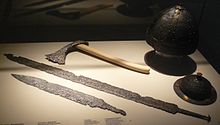Our website is made possible by displaying online advertisements to our visitors.
Please consider supporting us by disabling your ad blocker.
Franks


The Franks (Latin: Franci or gens Francorum; German: Franken; French: Francs) were a group of several related Germanic peoples who originally inhabited regions just outside the Roman empire, near the northernmost stretches of the fortified Rhine border (Limes). The Romans only began to refer to these tribes as Franks in the third century AD, at a time when they lost full control of the Rhine delta region. In the fourth century the Romans also began to distinguish tribes still further north with another new collective term "Saxons", although there are signs that the terms Frank and Saxon were not always mutually exclusive. The Franks lived for centuries under Roman hegemony, as the long-term neighbours of Germania Inferior, which was the most northerly Roman province in continental Europe, containing much of what is now the Netherlands, the German Rhineland, and Belgium. Over centuries, the Romans recruited large numbers of Frankish soldiers, some of whom achieved high imperial rank.
By the early fifth century Franks were living semi-independently throughout Germania Inferior. Large numbers of Eastern European peoples penetrated Rome's European border regions. The Roman administration of Britain and northern Gaul was breaking down, and in about 406 AD it was the Franks who attempted to defend the Roman border when it was crossed by Alans and Vandals. Frankish kings subsequently divided up Germania Inferior between them and at least one, Chlodio, began to rule more Romanized populations to the south. In 451 AD Frankish groups participated on both sides in the Battle of the Catalaunian Plains, where Attila and his allies were defeated by a Roman-led alliance of most of the various peoples who now lived in Gaul. By the early 6th century the whole of Gaul north of the Loire, and all the Frankish kingdoms, were united within the kingdom of the Frank Clovis I, the founder of the Merovingian dynasty. By building upon the basis of this empire the subsequent Frankish dynasty, the Carolingians, eventually came to be seen as the new emperors of Western Europe in 800, when Charlemagne was crowned by the pope.
Within the former Roman empire, the Franks became a multilingual, Catholic Christian people, who subsequently came to rule over several other post-Roman kingdoms both inside and outside the old empire. As the original Frankish communities merged into others, the term "Frank" lost its original meaning. In 870, the Frankish realm was permanently divided between western and eastern kingdoms, which were the predecessors of the later Kingdom of France and Holy Roman Empire respectively. In the European languages of the time, the Latin term Franci came to refer mainly to the people of the Kingdom of France, the forerunner of present day France. In a broader sense much of the population of western Europe were described as Franks. In various historical contexts, such as during the medieval crusades, not only the French, but also people from neighbouring regions in Western Europe, continued to be referred to collectively as Franks. The crusades in particular had a lasting impact on the use of Frank-related names which are used for all Western Europeans in many non-European languages.
Previous Page Next Page


